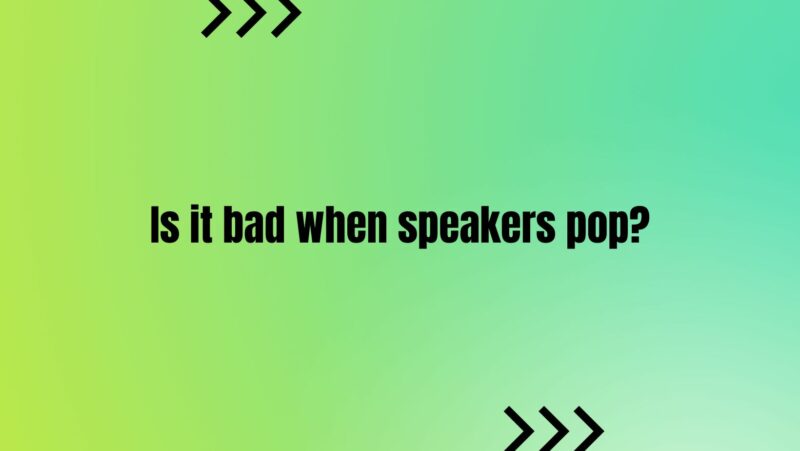The world of audio entertainment holds the power to immerse us in a realm of soundscapes, emotions, and experiences. However, this sonic paradise can be abruptly shattered by an unexpected and often disconcerting occurrence: speakers that emit popping sounds. This article delves into the perplexing phenomenon of speaker pops, seeking to demystify the implications behind these sounds, clarify whether they signal an issue, and provide guidance on appropriate responses to ensure the longevity and performance of your audio equipment.
The Nature of Speaker Pops
Before we plunge into the heart of the matter, it’s crucial to establish an understanding of what speaker pops entail. Popping sounds, often characterized by sharp, crackling, or clicking noises, arise from speakers during audio playback. These sounds can range from subtle and infrequent disturbances to more pronounced and persistent interruptions in the audio experience.
The Question: Are Speaker Pops Bad?
When faced with the unexpected pops, a common question arises: Are these sounds indicative of a critical problem that could potentially harm the speakers? To address this, we must dissect the potential causes, consider their implications, and dispel any misconceptions surrounding speaker pops.
Potential Causes of Speaker Pops
- Electrical Interference: External electronic devices or electromagnetic fields can interfere with the audio signal, leading to pops and crackles in the playback.
- Connection Issues: Loose or damaged cables and connectors can disrupt the audio signal, resulting in audible pops.
- Amplifier Transients: Amplifiers can produce transient signals when turned on or off, which may manifest as popping sounds through the speakers.
- Driver Response: Speakers’ drivers (the components responsible for producing sound) can react to sudden changes in the audio signal, leading to clicking or popping sounds.
- Physical Impact: Impact or mishandling of the speakers can cause components to move or dislodge, resulting in popping noises.
The Implications: Sorting Fact from Fiction
Myth: Speaker pops always indicate a severe problem that can damage the speakers.
Reality: While speaker pops can indeed point to issues, they do not invariably equate to imminent speaker damage. Rather than a blanket statement, it’s essential to consider various factors surrounding the pops.
Factors to Consider
- Frequency and Intensity: Infrequent and mild pops are less likely to cause damage compared to persistent and intense occurrences.
- Speaker Quality: Well-designed and quality speakers are constructed to tolerate a degree of stress, including occasional pops, without facing imminent harm.
- Consistency: If popping sounds consistently accompany audio playback, it might suggest an underlying issue that requires attention.
Potential Risks Associated with Popping Sounds
While not inherently detrimental, speaker pops can serve as red flags for underlying problems that might pose risks to your audio equipment:
- Amplifier Distortion: If an amplifier is producing distorted signals, it can cause the speaker components to react erratically, leading to wear and potential damage over time.
- Overloading Speakers: Prolonged exposure to high volumes or excessive power can result in distortion, which, if unchecked, might lead to wear and damage.
- Component Wear: Continuous or excessive movement of speaker components due to frequent pops could contribute to wear and reduced lifespan.
Appropriate Responses and Preventive Measures
To address and prevent the potential risks associated with speaker pops, consider implementing the following measures:
- Use Quality Components: Invest in high-quality cables, connectors, and speakers to ensure optimal performance and longevity.
- Regular Maintenance: Periodically inspect and clean your audio equipment to prevent dust and debris accumulation that could contribute to popping sounds.
- Monitor Amplifier Settings: Ensure your amplifier operates within its recommended capacity to prevent distortion and erratic signals.
- Choose Quality Sources: Play high-quality audio files from reputable sources to minimize the risk of introducing distortion.
- Seek Professional Evaluation: If popping sounds persist or intensify, consider seeking assistance from audio technicians who can diagnose and address potential issues.
Conclusion
The question of whether speaker pops are inherently bad is nuanced and context-dependent. While popping sounds do not necessarily spell immediate doom for your speakers, they should not be disregarded. These sounds often serve as indications of underlying issues that, if left unchecked, could lead to damage or compromised performance. By gaining a comprehensive understanding of the causes, implications, and appropriate responses to popping sounds, you can navigate the realm of audio disturbances with confidence. Remember that informed action, attention to detail, and timely maintenance are your allies in ensuring the continued enjoyment of high-quality audio experiences.


